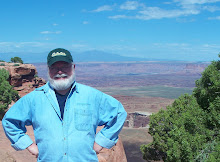I leave this to the Dear Reader to decide for themseves if they agree or not. From
www.phyliss-chesler.com. The writer is a retired professor of Women's Studies at City University of New York.
Why Women Still Won't Vote for Women
By Phyllis Chesler
Published October 15, 2010
 Phyllis Chesler, Ph.D. is professor emerita of psychology and the author of thirteen books including "Woman’s Inhumanity to Woman" and "The New Anti-Semitism." She has written extensively about Islamic gender apartheid and about honor killings. She once lived in Kabul, Afghanistan. She may be reached through her website: www.phyllis-chesler.com.
Phyllis Chesler, Ph.D. is professor emerita of psychology and the author of thirteen books including "Woman’s Inhumanity to Woman" and "The New Anti-Semitism." She has written extensively about Islamic gender apartheid and about honor killings. She once lived in Kabul, Afghanistan. She may be reached through her website: www.phyllis-chesler.com.
It is 2010, ninety years after American women first won the right to vote, and nearly fifty years after Betty Friedan’s influential work "The Feminine Mystique" was published, and women still do not want to vote for women.
And women definitely do not want to vote for Republican women.For example, in Connecticut, Republican Linda McMahon has only 34 percent of the female vote as compared to Democrat Richard Blumenthal who has 61 percent of the female vote. In Delaware, Republican Christine O'Donnell has only 25 percent of the female vote as compared to her Democratic opponent Chris Coons, who leads with 58 percent of the female vote; in Nevada, Democrat Harry Reid is beating Republican Sharron Angle by a 51-33 margin. According to pollsters, Sharron Angle is a “staunch conservative, something that tends to turn off female voters.”
Possibly, women as a group may view the Democratic Party as better on certain issues such as women’s reproductive rights and equal rights in the workplace. On the other hand, like men, many women have also lost their jobs, pensions, and homes, and will equally bear the consequences of a foreign policy gone wrong.
Whatever the reason, female candidates just can’t seem to please the female electorate. Women criticized Hillary Clinton for craving power in a non-feminine and “emotionless” way—and liked her when she showed emotion, not when she discussed policy. Women judged her harshly for sticking by her man—and then just as harshly for doing so in order to further her own political ambitions. Women, including progressive women, wanted perfection in their first female Presidential candidate. No political or character “hair” out of place. Thus, Professor Susan J. Douglas had this to say about Hillary:
“Hillary, by contrast, seems to want to be more like a man in her demeanor and politics, makes few concessions to the social demands of femininity, and yet seems to be only a partial feminist. She seems above us, exempting herself from compromises women have to make every day, while, at the same time, leaving some of the basic tenets of feminism in the dust. We are sold out on both counts. In other words, she seems like patriarchy in sheep’s clothing. If she’s a feminist, how could she continue to support this war for so long? If she’s such a passionate advocate for children, women and families, how could she countenance the ongoing killing of innocent Iraqi families, and of American soldiers who are also someone’s children? If it would be so revolutionary to have a female as president, why does she feel like the same old poll-driven opportunistic politician who seems to craft her positions accordingly?”
Today, women describe Linda McMahon as too “relentless” for a woman-- but certainly not for a politician. Women say they don’t like McMahon because she is “buying her seat” with money (as if this is not exactly what men do), and because she is attacking her opponent in “needlessly personal and caustic ways” (ditto).
Until pollsters start asking Republican women if they, also, dislike and will not vote for a female Republican candidate, let me suggest that what may also be going on is some vast unfinished psychological business between women.
As the author of "Woman’s Inhumanity to Woman," allow me to spell it out for you. Like men, women are also sexists. They still expect women to behave in “feminine” or maternal ways; this includes choosing a man as a protector, not as an opponent to publicly defeat in a very aggressive, “male” way.
Women and girls are more comfortable with expressing their aggression indirectly in less visible ways, through gossip, slander, and ostracism.
In addition, despite exceptions, women do not necessarily like, respect, or trust other women. Even more important, woman do not like another woman getting more attention than they themselves get; cheerleaders, beauty queens, gorgeous actresses are envied and ostracized more often than befriended by other girls and women. Female politicians are in the limelight; their female voters are not.
Psychologically, women do not like “difference.” Women feel safe when their female intimates dress, think, and behave as they do. If a female candidate looks, acts, or thinks “differently” from the female majority, women feel that their own life choices are not being honored. Thus, tough Republican businesswoman, Carly Fiorina, who faces tough career politician Barbara Boxer in California, has been advised to soften her image, to literally pose in her kitchen and wear pink—something she has done.
Yes, feminist women have worked hard for both male and female feminist candidates, and some Republican women are now working hard for Republican candidates, both male and female. And yet, the problem of our collective sexism still remains and will continue to determine how campaigns are conducted and who wins.
























